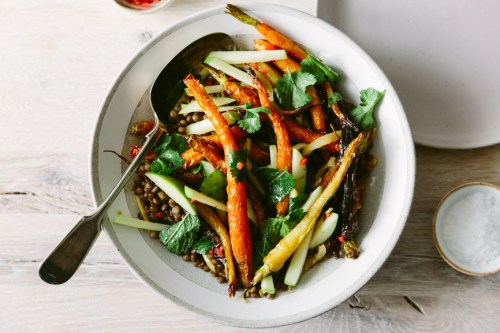Only 5 percent of Americans are getting enough fiber in their diet, which is one of the reasons it’s become a buzzy nutrient as of late. It’s super important for gut health, and it also helps to regulate blood sugar and keep you satiated, so the spotlight is definitely earned. But all this new focus on added fiber—coupled with a widespread switch to more plant-centric, inherently fiber-rich diets—might be making you feel all kinds of gastrointestinal discomfort. In other words, you’re bloated and gassy, which is a side effect that can make you want to swear off fiber forever. Since that wouldn’t be great for your tummy, either, you might want to instead try one simple, cheap trick to make it go down (and out) a bit easier: drinking water.
Experts in This Article
senior dietitian at UCLA Medical Center
board-certified gastroenterologist and hepatologist at Manhattan Gastroenterology
board-certified gastroenterologist at the Gastroenterology Institute of Southern California
registered dietitian and author of The Better Period Food Solution.
“Fiber requires water to be properly digested,” says Peyton Berookim, MD, a board-certified gastroenterologist at the Gastroenterology Institute of Southern California. “With the help of water, fiber turns to gel and slows digestion.”
Without water, stools can become too bulky and dry to pass through comfortably. The unfortunate result, says dietitian Dana Hunnes, RD, PhD, adjunct professor at the University of California Los Angeles, is constipation (and farts, an unpleasant accompaniment).
To help you envision how this works, Michael Dann, MD, a board-certified gastroenterologist at Manhattan Gastroenterology, offers a (gross, but useful) analogy. “If you’re trying to make dough, everyone knows that if you use too much water and not enough flour your dough will be runny,” he says. “If you use too much flour and not enough water your dough will be dry and hard. It’s the same concept for healthy having bowel movements.” Not enough fiber, and you may experience diarrhea. Too much, and you might be subsumed in a cloud of gas.
Count down the foods that help you poop with this dietitian’s guide to constipation:
So, if you’re adding more fiber to your diet, you likely need to be adding more water, too. “The general recommendation is roughly 1 ounce of water per kilogram of body weight. For example, a 140 pound woman would need 64 ounces of water per day,” says Dr. Hunnes. For most people, this averages out to around eight to night glasses per day.
If you’re already drinking (plus eating, through fruits and vegetables like celery) that much water and are still feeling constipated, you might want to try adding an additional glass or two. “In general, one should drink their water before or after their meal, but not during,” says Dr. Berookim. In fact, you need to be drinking water regularly, like every two hours, and not just trying to chug it all at once to make up for deficiency throughout the rest of the day, says Dr. Dann.
When calculating the amount of water needed to keep things flowing (er, dropping?) smoothly, you’ll also need to account for exercise, the amount of caffeine and alcohol consumed, and heat exposure, say the experts. In other words, if you’re highly active, drink several cups of coffee a day, enjoy an alcoholic beverage or two at night, or are exposed to hot weather, you need to add on to those baseline eight or nine glasses, too. This doesn’t just require a mild uptick in fluids, either; Dr. Dann says you may need to increase your intake by about a full 33%.
While this may feel like a lot of trouble to go to just to poop properly, Dr. Berookim points out that the digestive system is not unique in its need for water; all organ systems require hydration for proper function. And if nothing else can motivate you to stay hydrated, perhaps the prospect of being trapped inside with a cloud of your own farts for the next six months will.
Here’s a dietitians guide to gut health:
Oh hi! You look like someone who loves free workouts, discounts for cult-fave wellness brands, and exclusive Well+Good content. Sign up for Well+, our online community of wellness insiders, and unlock your rewards instantly.
Sign Up for Our Daily Newsletter
Get all the latest in wellness, trends, food, fitness, beauty, and more delivered right to your inbox.
Got it, you've been added to our email list.











